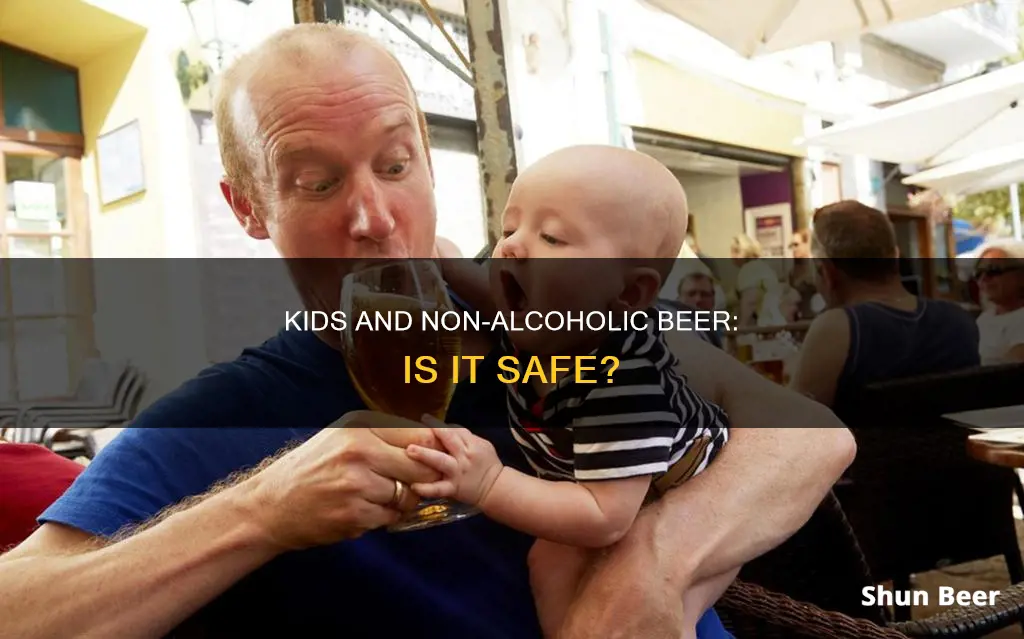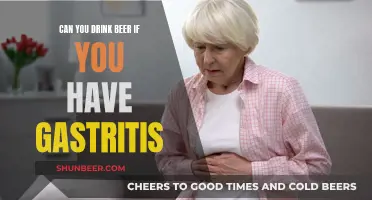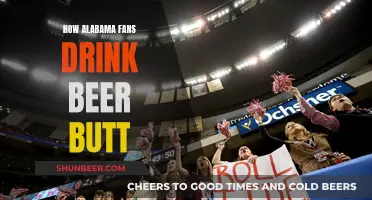
Actress Kristen Bell recently revealed that her 8- and 9-year-old daughters like the taste of non-alcoholic beer and have even ordered it at restaurants. This has sparked a debate about whether it is appropriate for minors to consume non-alcoholic beverages. While some people argue that it is a personal family decision, others express concern about the potential risks associated with normalizing alcohol consumption for children. From a legal standpoint, the federal government in the United States allows minors under the age of 21 to consume non-alcoholic drinks, as long as they contain less than 0.5% ABV. However, state laws vary, and some states have stricter regulations, prohibiting minors from drinking non-alcoholic beer altogether. Aside from the legal considerations, there are also health implications to consider, with experts stating that non-alcoholic beer may increase the risk for addiction and have other negative health impacts on children.
What You'll Learn

Non-alcoholic beer is federally allowed for minors in the US
Non-alcoholic beer is a beverage that does not contain alcohol. However, the term 'non-alcoholic' is often misleading as most non-alcoholic beers contain up to 0.5% alcohol by volume (ABV). Despite this, when consumed in moderation, non-alcoholic beers will not cause intoxication.
In the United States, the National Minimum Drinking Age (NMDA) Act of 1984 defines "alcoholic beverage" as "beer, distilled spirits, and wine containing one-half of 1% or more of alcohol by volume". This means that non-alcoholic beers with less than 0.5% ABV are not considered "beer" under federal law and are therefore legally consumable by minors.
However, it is important to note that state laws may vary. While federal law allows minors to consume non-alcoholic beer, some states have their own regulations surrounding the sale and service of these beverages to minors. For example, Mississippi, North Dakota, and Ohio only permit the consumption of non-alcoholic beer by those aged 18 and older, while 14 states prohibit minors from drinking non-alcoholic beer altogether.
Ultimately, the legality of minors consuming non-alcoholic beer depends on the specific laws and regulations of the state in which they reside. Parents and guardians must do their own research and check with local and state laws to make an informed decision regarding their children's consumption of non-alcoholic beer.
Beer After a Workout: Good or Bad Idea?
You may want to see also

Some states have their own restrictions on non-alcoholic beer for minors
While the federal government does not prohibit minors from consuming non-alcoholic beverages, some states have their own restrictions on non-alcoholic beer for minors. The National Minimum Drinking Age (NMDA) Act of 1984 defines "alcoholic beverage" as "beer, distilled spirits, and wine containing one-half of 1% or more of alcohol by volume". Therefore, non-alcoholic beverages with less than 0.5% ABV are not considered "beer" and can be consumed by minors. However, some states have their own definitions of what constitutes an alcoholic beverage, and the laws vary across different states.
For example, in Maryland, there are no state age restrictions on purchasing adult non-alcoholic beverages. However, some retailers in the state, such as the zero-proof bottle shop Hopscotch, choose to set their own age limits and only sell to customers who are 18 or older. In Michigan, the sale of non-alcoholic beer is restricted to those 18 and older, but there are no such policies for non-alcoholic wines or liquors. On the other hand, some states, like Mississippi, North Dakota, and Ohio, only allow the drinking of non-alcoholic beer for those 18 and older. Additionally, 14 states, including Kansas, prohibit minors from consuming non-alcoholic beer, even if it falls below the federal definition of an "alcoholic beverage".
The laws regarding the purchase of non-alcoholic beer by minors are also inconsistent across states. While some states allow minors to purchase non-alcoholic beer, others do not. For instance, 17 states bar the purchase of non-alcoholic beer by those under 21, and in Ohio, the minimum age to purchase is 18. These inconsistencies in state laws and retailer policies can make it challenging for individuals to navigate the legal landscape surrounding non-alcoholic beverages.
Beer and Theraflu: A Safe Mix?
You may want to see also

Non-alcoholic beer may act as a gateway to drinking for kids
Non-alcoholic beer has gained a lot of popularity in recent years, with many adults opting for these beverages to cut back on drinking, avoid hangovers, or prevent the ill health effects of alcohol. However, the question of whether kids should be allowed to consume non-alcoholic beer has sparked some debate. While federal law in the United States states that minors under the age of 21 can consume beverages with less than 0.5% alcohol by volume (ABV), some researchers and psychologists argue that non-alcoholic beer could act as a gateway to drinking for kids.
The main argument supporting this claim is that non-alcoholic beverages closely mimic their alcoholic counterparts in taste, smell, and cultural experience. For instance, drinking a non-alcoholic beer from a beer can or a fancy glass can provide the same cultural experience as drinking an alcoholic beer. This argument is supported by a recent study from Japan, which found that adolescents who consumed non-alcoholic beverages that mimicked alcohol showed greater interest in consuming alcohol. This suggests that early exposure to non-alcoholic beer may increase the likelihood of kids transitioning to alcoholic beverages in the future.
Additionally, some full-strength alcohol producers have started making non-alcoholic products, which could lead to brand familiarity and potentially increase the likelihood of kids purchasing alcoholic products from these producers when they are older. This is similar to the argument against candy cigarettes, which are seen as a potential gateway to smoking for kids. Proponents of this view believe that non-alcoholic beer, wine, and liquor should have clear and consistent age limits to prevent them from becoming an entry product for alcohol use.
However, others argue that non-alcoholic beer should be accessible to minors, as it provides an alternative for those who are underage and a way to fit in at social events. In some states, minors are allowed to consume non-alcoholic beer with parental permission or in the presence of a parent or guardian. Ultimately, the decision to allow kids to drink non-alcoholic beer rests with the parents or guardians, who must consider the potential effects and local and state laws.
Beer and Painkillers: How Does Ibu Work?
You may want to see also

Non-alcoholic beer is not completely alcohol-free
The laws and regulations surrounding non-alcoholic beer vary across different regions. In the US, the ATF's Tobacco Tax and Trade Bureau (TTB) defines "non-alcoholic" beer as containing less than 0.5% ABV, while "alcohol-free" beer must contain no alcohol at all (0.0% ABV). However, in the UK, the term "non-alcoholic" cannot be used for beverages commonly associated with alcoholic drinks, such as beer. Instead, they use the term "de-alcoholised" for beers with an ABV of 0.5% and "alcohol-free" for beverages with less than 0.05% ABV.
The brewing process for non-alcoholic beer is similar to that of regular beer, using the same basic ingredients and fermentation processes. The difference lies in the type of fermentation used to remove the alcohol. Controlled fermentation methods are the most popular, where fermentation is cut off before completion to control for a lower ABV. However, trace amounts of alcohol may still remain in the final product. Other methods, such as dealcoholization, involve removing the alcohol from the brew through heating, dilution, or vacuum distillation.
The availability and accessibility of non-alcoholic beer also play a role in its popularity. While there is a growing demand for high-quality non-alcoholic options, they can still be harder to find, especially in bars and restaurants. Additionally, the perception that non-alcoholic beer does not taste as good as regular beer may also contribute to its lower popularity.
The health implications of non-alcoholic beer are also important to consider. While it may be a healthier alternative to regular beer, reducing overall alcohol consumption, it is not completely free of risks. Some individuals, such as pregnant women and those with a history of alcohol abuse, may need to be cautious about consuming non-alcoholic beer due to the presence of trace amounts of alcohol.
Antacids and Beer: A Safe Mix?
You may want to see also

Non-alcoholic beer is a fast-growing market
- Health Consciousness: The primary driver of the non-alcoholic beer market's growth is the rising health consciousness among consumers. People are becoming more aware of the negative health effects of alcohol, such as its contribution to cardiovascular diseases and other alcohol-related diseases. As a result, many are opting for healthier alternatives like non-alcoholic beers, which have been linked to improved blood circulation and a reduced risk of heart disease.
- Digestive Benefits: The non-alcoholic beer market is also benefiting from the increased prevalence of digestive disorders. Non-alcoholic beer has been found to improve gut microbiome variety, leading to beneficial health effects. This has boosted the intake of alcohol-free beers, as consumers seek ways to improve their digestive health.
- Alcohol Allergies and Immune System Concerns: The market is further propelled by the significant rise in cases of alcohol allergies and weak immune systems. Non-alcoholic beers provide an alternative for those who are allergic to alcohol or have compromised immune systems.
- Changing Consumer Preferences: There is a noticeable shift in consumer preferences towards healthier and more natural alternatives. Non-alcoholic beers, particularly those made from natural ingredients, are gaining popularity. Additionally, consumers are increasingly concerned about the negative effects of excess sugar and calorie consumption, making non-alcoholic beers an attractive option.
- Innovation and New Product Development: The non-alcoholic beer market is witnessing a surge in innovation and new product launches. Companies are introducing innovative products to meet the growing demand for healthy alternatives. For example, UNLTD IPA launched an alcohol-free beer that is low in calories, vegan-friendly, and gluten-free. These new products cater to specific consumer needs and preferences, driving market growth.
- Millennial and Female Consumers: The rising popularity of non-alcoholic beer among millennials and women is also contributing to market expansion. Millennials, in particular, are becoming more health-conscious and aware of the benefits of non-alcoholic beer. Additionally, young athletes are increasingly using non-alcoholic beer as a recovery beverage, further boosting its popularity.
- Increased Online Retail and Social Media Campaigns: The non-alcoholic beer market is expected to benefit from increasing online retail and social media campaigns. The ability to reach a wider audience through online channels and social media platforms will amplify overall product sales and awareness.
While the non-alcoholic beer market is experiencing significant growth, it is important to note that there are differing regulations and perceptions regarding the consumption and sale of these beverages to minors. Some researchers argue that non-alcoholic beers could be a gateway to drinking for children and advocate for clear and consistent age restrictions. However, the decision to allow minors to consume non-alcoholic beer ultimately lies with their parents or guardians, who must consider the potential effects and local and state laws.
Hawaii's Beach Beer Rules: What You Need to Know
You may want to see also
Frequently asked questions
In the US, federal law states that minors under the age of 21 can consume non-alcoholic beverages, even those with less than 0.5% ABV. However, some states have their own laws, with Mississippi, North Dakota, and Ohio only permitting non-alcoholic beer consumption for those 18 and older, and 14 states prohibiting minors from drinking it.
In the US, federal law does not prohibit minors from buying non-alcoholic beer. However, some states have their own laws, with 17 states barring the purchase of non-alcoholic beer by those under 21, and Ohio setting the minimum age to purchase at 18.
Corona non-alcoholic beer contains less than 0.5% ABV, so federal law in the US permits minors to drink it. However, some states have their own laws, as outlined above.
As above, federal law does not prohibit minors from buying non-alcoholic beer, but some states have their own laws.







